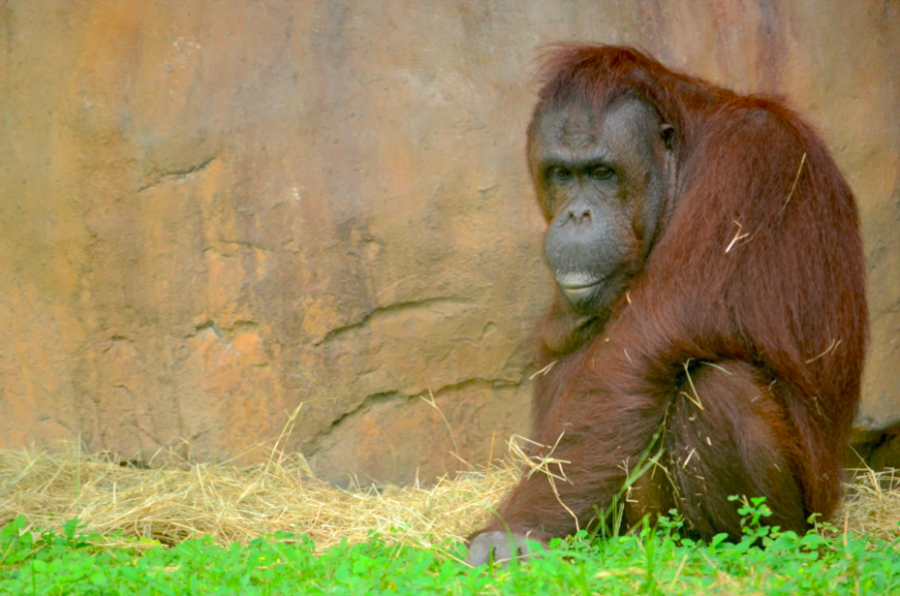Palm Oil Is Driving Asian Animals to Extinction
Borean Orangutans are one of the animals most impacted by the harsh reality of the palm oil industry. Kumang is one of the two Orangutans at Miami Zoo and is the mother of 6-year-old Bella. Kumang and Bella are animals that are essential to their ecosystem, as a keystone species, their habitat would dismantle after their extinction.
May 4, 2020
The palm oil industry is one of the most successful markets in the modern world, yet it is also one of the most controversial. Accounting for one-third of all oils used in American homes, the industry has been fundamental for every household, but has been killing animals for the past century, and may soon lead many to extinction.
The oil itself isn’t what’s causing the harm; it is deforestation. Several species of animals inhabit the jungles where African Oil Palm trees are planted, contributing to the reasons why so many animal species are severely endangered.
According to the World Wide Fund for Nature, 300 football fields worth of rainforest are wiped out every hour in order to plant the palm oil trees. Over 30,000 animals are directly affected by the harvesting, including the Sumatran and Bornean Orangutans, Sumatran Tigers, Bornean Pygmy Elephants, Sumatran Rhinos, Malayan Sun Bears, and many others. The extinction of these species might not matter to an average American, but it will cause severe issues for their environment and for zoos across the country.
Zoo Miami currently has two of the animals typically affected by palm oil harvesting, the Sumatran tiger and the Bornean Orangutan. Both critically endangered, the Bornean Orangutan has a population of 100,000, whilst the Sumatran Tiger has less than 400 individuals.
“If we don’t adopt a culture of sustainability we will lose species, such as the orangutan, due to the effects of the palm oil industry and promote negative impacts of the deforestation driven by the industry,” said Jessica Parks, a member of the Zoo Miami Foundation. “Climate change is a global issue and the palm oil industry is one contributor.”
Like the rest of the animals being affected, the Sumatran Tiger and the Bornean Orangutan are of great importance to their environment. The orangutans play a significant role in the distribution of seeds and are responsible for the growth of several trees in the forests they are native to. Sumatran tigers, on the other hand, are key to the biodiversity of Sumatra. The Island of Sumatra is the only place on earth where tigers, orangutans, elephants, and rhinos are capable of living together in harmony.

Satu, the youngest of three Sumatran tigers at Miami zoo stands in his enclosure with his tongue hanging out his mouth. He is one of the few tigers that are left in the world and is part of the Species Survival Plan to ensure there is an abundant population of tigers for generations to come.
“Once we lose a species we can’t get them back and every species has a place within an ecosystem that affects the survival of others. These animals help ensure the continuation of plant life within habitats,” said Parks.
Both animals are fundamental to their habitat and the animals around them, making them a keystone species, meaning that a number of other animals including the environment is dependent on them. So if the tigers and the orangutans were to go extinct, it is likely that multiple other species would follow.
“It is such a shame to see so many beautiful animals, such as tigers, elephants, and orangutans, go endangered due to humans using palm oil in the way that they do,” said junior and Conservation Teen Scientist Raul Mederos.
Taste and quality are just some of the factors as to why palm oil outshines other vegetable oils. According to the American Chemist Oil Society, palm oil has high productivity properties, contains vitamins A and E, and protects against heart disease. It became the ideal alternative for several products, as it contains significantly less trans fat than other options. Considering it can be harvested throughout all 12 months in the year, and is cheaper than other vegetable oils, palm oil proves to be the preeminent oil among others and the most obvious choice for manufacturers.
As stated in a recent article by Palm Green, 50% of all items in a supermarket contain palm oil. Therefore, it is important to be on the lookout whenever out purchasing groceries. Products such as lipstick, biodiesel, pizza, zoodles, and ice cream all use the oil.
A lot of companies have taken note that consumers are purposefully avoiding palm oil products, and therefore started to use alternatives to trick buyers. According to WWF, vegetable oil, palm kernel, lactylate/sulfate, etc. are all variations to the same item.
However, don’t fret: just because a product uses palm oil doesn’t mean it’s bad. Sustainable palm oil differs greatly from unsustainable palm oil. According to CCS global issues, “unsustainable palm oil requires forests to be cut down as opposed to sustainable palm oil which does not.” Many farms are working towards getting approved as a sustainable palm oil plantation. These certifications will be given by the Roundtable on Sustainable Palm Oil (RSPO).
According to Eco Watch, many reputable companies use palm oil and have not taken steps into the sustainability direction. Pepsico, Dunkin’ brands, Ikea, and Kelloggs are all companies that have yet to start using sustainable palm oil.”Zoo Miami educates 1 million people that come through the zoo about palm oil and what they can do to help through keeper talks, signs, and interactions with volunteers,” said Parks. “We also support various organizations that seek to protect the areas affected.”
You can help the environment by avoiding products that contain unsustainable palm oil. You can do so by searching for the Palm Green or RSPO safe tag in a product or by downloading an app called “Palm Smart”. In the app, you can either search or scan an item and the app will notify whether it is sustainable or not.

















